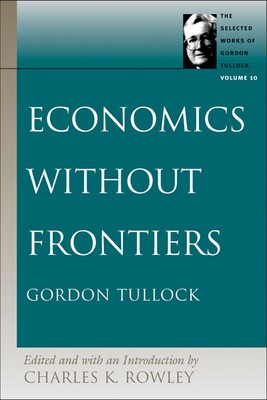
- We will send in 10–14 business days.
- Author: Gordon Tullock
- Publisher: Liberty Fund
- ISBN-10: 086597540X
- ISBN-13: 9780865975408
- Format: 15.2 x 22.9 x 4.1 cm, minkšti viršeliai
- Language: English
- SAVE -10% with code: EXTRA
Reviews
Description
Gordon Tullock delights in deploying rational-choice analysis effectively to areas widely considered to be outside the domain of economics. This volume illustrates the strength of this endeavor by reproducing the very best chapters from his controversial textbook The New World of Economics. It also highlights Tullock's innovative contributions to bioeconomics, another area in which he pioneered the application of economic methods. Other sections of this volume reproduce his best contributions to more traditional areas of study, further solidifying the innovative strength of his scholarship.
Gordon Tullock is Professor Emeritus of Law at George Mason University, where he was Distinguished Research Fellow in the Center for Study of Public Choice and University Professor of Law and Economics. He also taught at the University of South Carolina, the University of Virginia, Rice University, Virginia Polytechnic Institute and State University, and the University of Arizona. In 1966 he founded the journal that became Public Choice and remained its editor until 1990.
Charles K. Rowley was Duncan Black Professor of Economics at George Mason University and a Senior Fellow of the James M. Buchanan Center for Political Economy at George Mason University. He was also General Director of the Locke Institute.
- Author: Gordon Tullock
- Publisher: Liberty Fund
- ISBN-10: 086597540X
- ISBN-13: 9780865975408
- Format: 15.2 x 22.9 x 4.1 cm, minkšti viršeliai
- Language: English English
Gordon Tullock delights in deploying rational-choice analysis effectively to areas widely considered to be outside the domain of economics. This volume illustrates the strength of this endeavor by reproducing the very best chapters from his controversial textbook The New World of Economics. It also highlights Tullock's innovative contributions to bioeconomics, another area in which he pioneered the application of economic methods. Other sections of this volume reproduce his best contributions to more traditional areas of study, further solidifying the innovative strength of his scholarship.
Gordon Tullock is Professor Emeritus of Law at George Mason University, where he was Distinguished Research Fellow in the Center for Study of Public Choice and University Professor of Law and Economics. He also taught at the University of South Carolina, the University of Virginia, Rice University, Virginia Polytechnic Institute and State University, and the University of Arizona. In 1966 he founded the journal that became Public Choice and remained its editor until 1990.
Charles K. Rowley was Duncan Black Professor of Economics at George Mason University and a Senior Fellow of the James M. Buchanan Center for Political Economy at George Mason University. He was also General Director of the Locke Institute.


Reviews